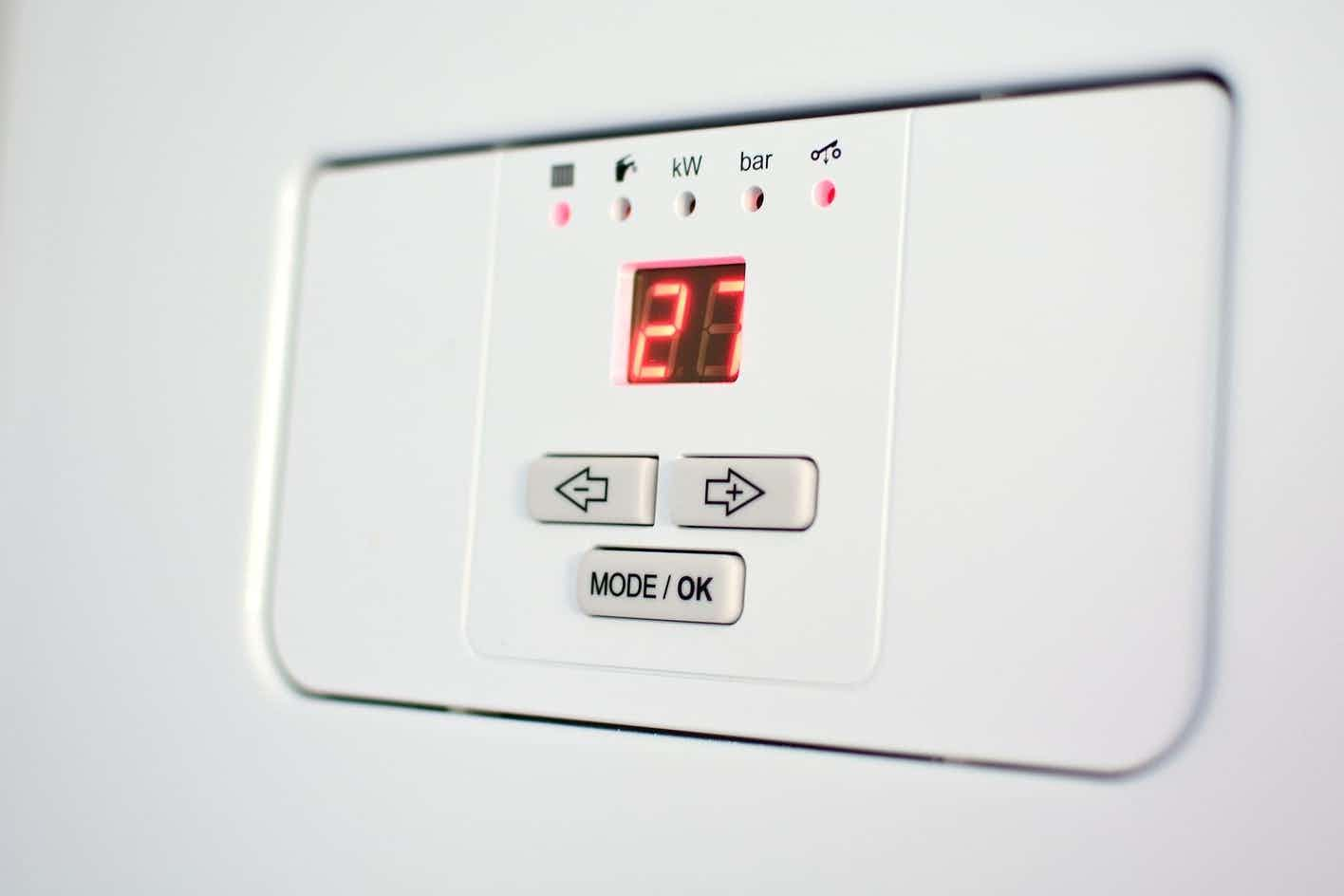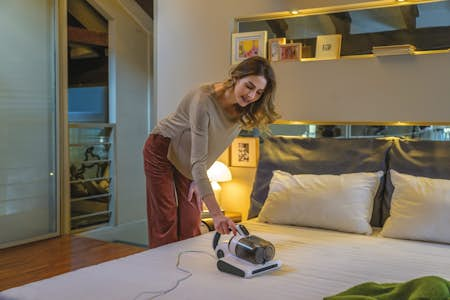We rely on our boilers to function correctly day in, day out.
In the UK, most boilers operate on natural gas supplied through the mains gas grid. A smaller portion of boilers utilise LPG or oil, which are suitable for off-grid residences and rural locations without access to the gas grid.
At their core, all boilers use a fuel source, such as natural gas, to heat water. Hot water then travels around your house via pipes to your taps and radiators.
While boilers can last for 20, 30 or even 40 years or more, there comes a time when replacing them is the best bet, either due to catastrophic failure, escalating repair costs, or increasing heating bills.
Here is a comprehensive guide to the cost of new boilers.
Different types of boilers
There is more than one type of boiler.
Firstly, boilers can run off gas (most common), LPG or oil (for off-grid properties), or electricity.
According to uSwitch, around 23 million homes have a gas boiler. There are about 25 million homes in the UK, so that's approximately 92% that have a gas boiler.
Although gas boilers generally function similarly and fulfil the same basic functions, there are three main categories:
- Combination boilers (or gas combi boilers)
- Traditional/regular/heat-only boilers (referred to by multiple names)
- System boilers
Around 80% of the UK's boilers are combi boilers, which have rapidly become the most popular boiler type since the early 2000s.
However, the other two boiler types are still common, and not all properties are suited to all three boiler types.
Replacing a boiler can be a daunting task, but it can save you money in the long run. If you're considering replacing your boiler, you may want to check out Heatable (www.heatable.co.uk), a UK-based company that offers affordable boiler installation and replacement services. Use code AT50 to get £50 off your new boiler.
Let’s take a closer look at the three main types of boilers:
1: Combination boilers
Combination boilers are a relatively recent innovation most commonly found in flats and smaller houses.
High-end combination boiler models have become more powerful and are now suitable for various properties, including larger 3-bed and 4-bed homes.
Combi boilers comprise a single unit connecting to the mains water supply and radiators. The boiler draws cold water directly from the mains, heats it directly within the boiler unit, and sends it to radiators, taps, and showers.
One of the primary advantages of combi boilers is their space-saving design. With only a compact unit, usually installed in a cupboard, and no water tanks, they’re well-suited for smaller properties.
- Provide both heating and hot water from a single unit.
- Heat water on demand, eliminating the need for a separate hot water tank.
- Higher kW ratings due to the need to heat water quickly.
- Ideal for smaller homes or flats with lower hot water demands.
- Compact design saves space in your home.
Pros:
- Space-saving, no need for a separate hot water cylinder or storage tank.
- Hot water is available on-demand with no waiting time.
- Energy-efficient as they only heat the water you use.
Cons:
- Limited hot water flow rate, not suitable for multiple outlets simultaneously.
- Not ideal for large homes with multiple bathrooms and high hot water demand.
- May require upgrades to existing heating infrastructure in older homes.
2: Conventional/regular/heat-only boilers
Conventional boilers, sometimes called regular or heat-only boilers, are often found in houses with a loft.
These are common in pre-1990s homes where the boiler hasn't been replaced, and to be fair, many of the boilers from that era are incredibly long-lasting.
These boilers use hot water tanks, usually placed in the airing cupboard, and feature two feed tanks in the attic – a central heating feed tank and a hot water feed tank. The feed tanks rely on gravity to supply the boiler and hot water tank with water from the main supply.
Traditional heating systems are typically 'open vented,' meaning they’re exposed to the atmosphere in the loft where the feed and expansion tanks are installed. Unfortunately, this design makes them prone to debris, oxidation, and sludge buildup.
Conventional systems offer reliable pressure since they’re gravity-fed and do not solely rely on mains pressure. Additionally, the hot water cylinder ensures a steady hot water supply for multiple taps and showers.
- Also known as regular or heat-only boilers.
- Require separate hot and cold water storage tanks (usually in the loft).
- Suitable for homes with multiple bathrooms or high hot water demands.
- Can supply hot water to multiple taps simultaneously.
- Compatible with older radiator systems and properties with low water pressure.
- Can be easily combined with renewable energy sources.
Pros:
- Can supply hot water to multiple outlets simultaneously.
- Compatible with older heating systems and infrastructure.
- Ideal for homes with multiple bathrooms and higher hot water demands.
Cons:
- Requires space for a separate hot water cylinder and cold-water storage tank.
- Hot water is unavailable on-demand and can run out, requiring time to reheat.
- Less energy-efficient compared to combi and system boilers.
3: System Boilers
Like traditional boilers, system boilers use a hot water cylinder to meet higher water demands.
However, unlike traditional boilers, system boilers aren’t fed by a tank in the loft, making them relatively compact. Instead, system boilers draw water directly from the mains like combi boilers.
System boilers are excellent for modern radiator systems that can handle higher pressure and are suitable for larger homes with three or more bathrooms. They're the contemporary alternative to conventional systems when a combi system doesn't suffice for the home's heating and water demands.
However, they might not be ideal for directly replacing a traditional boiler without also upgrading the radiators and plumbing. This is because older plumbing may not tolerate the increased pressure from modern boilers.
- Similar to conventional boilers but with some components built-in.
- Require a hot water storage tank, but no cold water storage tank.
- Faster hot water delivery than conventional boilers due to the built-in components.
- Easier to install as fewer external components are needed.
- Good for homes with multiple bathrooms or high hot water demands.
- Can work with solar thermal systems for increased energy efficiency.
Pros:
- Can supply hot water to multiple outlets simultaneously.
- No need for a cold-water storage tank, saving space.
- More energy-efficient than conventional boilers.
Cons:
- Requires space for a separate hot water cylinder.
- Hot water is not available on-demand and can run out, needing time to reheat.
- Not as energy-efficient as combi boilers.
For homeowners looking to upgrade their heating system, Heatable offers a unique range of services, including the installation of combination boilers, conventional/regular/heat-only boilers, and system boilers.
Their high-end combination boiler models are now suitable for various properties, including larger 3-bed and 4-bed homes, and provide both heating and hot water from a single unit. With no need for a separate hot water tank, they're energy-efficient and space-saving, making them ideal for smaller homes or flats with lower hot water demands.
Heatable also offers conventional/regular/heat-only boilers, which are suitable for homes with multiple bathrooms or high hot water demands. These boilers require separate hot and cold water storage tanks and can supply hot water to multiple taps simultaneously. However, hot water is unavailable on-demand and can run out, requiring time to reheat.
For larger homes with three or more bathrooms, Heatable offers system boilers, which require a hot water storage tank but no cold water storage tank. They're faster in hot water delivery than conventional boilers due to the built-in components, and they're more energy-efficient than conventional boilers. However, hot water is not available on-demand and can run out, needing time to reheat.
Whether you're looking for a space-saving and energy-efficient combi boiler or a reliable conventional or system boiler, Heatable can help you find the perfect solution for your home's heating and hot water needs.
Use code AT50 to get £50 off your new boiler with Heatable.
Determining the ideal boiler size for your home
Choosing the correct boiler for a home can be a challenging task.
While larger properties with higher heating and hot water demands need bigger boilers, other factors like insulation, the number of radiators, and average hot water usage should also be considered.
Calculating boiler size
Boilers have varying power outputs, typically measured in kilowatts (kW).
Kilowatts are a measure of power, reflecting how much energy a boiler can convert into heat.
Each boiler on the market has a kW rating, but comparing different boiler types based on this value alone is insufficient. For instance, combi boilers generally have higher kW ratings than system or conventional boilers because they provide hot water on demand.
System and conventional boilers heat water in a hot water tank more gradually and thus have lower ratings, despite having the same overall power output. Moreover, combi boilers often have two separate ratings for hot water and heating.
Factors to consider for boiler sizing
To determine the correct boiler size for your home, consider the following factors:
- The number of radiators: While flats may have as few as six, larger homes can have over 30. A more powerful boiler is required for a more significant number of radiators, as an underpowered boiler will not heat them efficiently.
- Insulation and energy performance: Homes with excellent insulation and energy efficiency are cheaper and easier to heat. A well-insulated home requires a lower-rated boiler, reducing heating costs and energy consumption. In contrast, a poorly insulated home that loses significant heat will need a larger boiler for adequate heating.
- The number of bathrooms: Higher hot water demands necessitate more powerful boilers. Combi boilers, in particular, may struggle to provide sufficient hot water for more than two bathrooms in larger households. However, system and conventional boilers with hot water tanks can accommodate higher hot water demands.
Choosing a combi boiler
Combi boilers provide heating and hot water from a single unit without needing a separate tank.
As a result, they require more power and have higher kW ratings than equivalent system and conventional boilers.
The table below illustrates the average combi boiler size needed for various homes. Installing a system or conventional boiler instead is often preferable for larger homes with greater hot water demands.
Bedrooms | Radiators | Bathrooms | Power rating (Combi boiler) |
1 to 2 | 0 to 10 | 1 | 24 to 27kW |
3 to 4 | 10+ | 2-3 | 28 to 34kW |
More than 4 | 20+ | More than 3 | 35 to 43kW |
Choosing a system or conventional boiler
In terms of power, system and regular boilers are pretty similar. They don't require as much energy as combi boilers but may not necessarily be cheaper to run since they continuously heat water instead of doing it on-demand like combi boilers.
System and conventional boilers are most effective in larger homes, but they both require extra space for the hot water tank and cold water feed (for conventional boilers).
The table below shows the average system or regular boiler size needed for different homes.
Smaller homes or flats with fewer than ten radiators are typically better suited for combi boilers.
Bedrooms | Radiators | Bathrooms | Power rating (System or conventional boiler) |
1 to 2 | 0 to 10 | 1 | 12 to 15kW |
3 to 4 | 10+ | 2-3 | 18 to 25kW |
More than 4 | 20+ | More than 3 | 30 to 35kW |
What size boiler do I need for my home?
The size of your home, the number of bedrooms, and the number of bathrooms are key factors in determining the appropriate boiler size.
Here, we'll discuss the ideal boiler size for different properties, from flats to 5-bedroom houses.
Flats
In most cases, flats with one or two bedrooms are best served by a compact combi boiler.
Combi boilers have higher kW ratings as they heat water on demand, but this doesn't mean they're less efficient or more expensive to run.
A combi boiler with a rating of around 24 to 27kW is recommended for a flat. However, if you prefer a small system boiler for a larger flat, a 12 to 15kW rating should be sufficient.
1-bedroom houses
Compact combi boilers are ideal for 1-bedroom houses, but small system boilers can also be viable.
As hot water requirements for such homes are typically low, a combi boiler with a rating of around 24 to 27kW should suffice. For a system boiler, a rating of 14 to 18kW is recommended.
2-bedroom houses
For 2-bedroom houses, a compact combi boiler is usually sufficient. However, a system boiler could be more appropriate in homes with higher hot water demands, such as those with multiple occupants.
A combi boiler with a rating of around 25 to 27kW should suffice, while a 15 to 20kW system boiler can handle higher demands.
3-bedroom houses
When it comes to 3-bedroom homes, combi boilers can still be suitable, but system and conventional boilers become viable.
A combi boiler with a rating of 28 to 34kW can replace them, but a system boiler may be more appropriate. A rating of 18 to 24kW is recommended for system or conventional boilers.
4-bedroom houses
For 4-bedroom homes with over 20 radiators and three bathrooms, system and conventional boilers have an advantage over combi boilers, mainly when multiple people use bathrooms simultaneously.
Combi boilers with ratings between 30 and 45kW can handle most heating and hot water demands, but a 27 to 40kW conventional or system boiler is likely more efficient for high-demand situations.
5-bedroom houses
Though it's often suggested that combi boilers aren't suitable for large houses, this depends on hot water demands.
A family of five living in a 5-bedroom home with high hot water requirements (e.g. with three showers being used simultaneously) would benefit more from a conventional or system boiler.
For a 5-bedroom home, it’s probably best to opt for a modern conventional or system boiler rated above 40kW or thereabouts.
Assessing boiler replacement costs
When working out the costs of boilers, it's essential to consider not only the boiler's price but also the installation costs.
Let's turn our attention to new boiler installation costs.
Cost of conventional boilers
Conventional boilers are a popular choice for larger homes with more than one bathroom. They require a separate hot water cylinder and a cold water storage tank.
- Boiler cost: £500 - £2,000 (depending on the brand, model, and capacity)
- Installation cost: £1,000 - £1,500 (excluding the cost of the boiler)
Cost of system boilers
System boilers are similar to conventional boilers but do not require a separate cold water storage tank.
Therefore, they’re suitable for homes with more than one bathroom and high hot water demand. System boiler deals may include discounts on the hot water tank.
Average new system boiler costs are below.
- Boiler cost: £600 - £2,500 (depending on the brand, model, and capacity)
- Installation cost: £900 - £1,400 (excluding the cost of the boiler)
Cost of combi boilers
Combi boilers are the most popular boiler type in the UK. They provide heating and hot water directly from the boiler without needing a separate hot water cylinder or cold water storage tank.
They’re suitable for smaller homes with one or two bathrooms. Combi boiler installation is typically quick and easy. Average combi boiler costs are below.
- Boiler cost: £500 - £3,000 (depending on the brand, model, and capacity)
- Installation cost: £800 - £1,200 (excluding the cost of the boiler)
Average prices of different brands of boilers
Below are the costs of the leading and best boiler manufacturers for combo, system and conventional boilers.
Costs are for the boiler alone and vary between boiler brands and models.
Manufacturer | Combi boiler price range | System boiler price range | Conventional boiler price range |
Worcester Bosch | £900 - £2,970 | £1,090 - £2,620 | £920 - £2,510 |
Vaillant | £1,010 - £1,790 | £990 - £2,270 | £960 - £1,790 |
Viessmann | £950 -£1,560 | £1,210 - £1,490 | £990 - £1,560 |
Ideal | £930 - £1,500 | £980 - £1,430 | £960 - £1,800 |
Alpha | £720 - £1,800 | £960 - £2,580 | £810 - £910 |
Baxi | £760 - £1,800 | £930 - £1,180 | £830 - £1,800 |
Average costs of new boiler replacement
Below is a table of different boiler types with their respective costs of the boiler and installation.
These costs apply to most reasonably straightforward boiler replacements.
However, upgrading other aspects of the heating system (e.g. radiators, pipes and valves) will add more to the cost.
Boiler type | Boiler cost | Installation cost | Total cost |
Conventional | £650 - £2,150 | £1,200 - £2,200 | £1,850 - £4,350 |
System | £750 - £2,650 | £1,100 - £2,200 | £1,850 - £4,850 |
Combi | £650 - £3,150 | £1,000 - £2,200 | £1,650 - £5,350 |
Extra costs of new boiler installation
Boiler installation varies from a simple and cost-effective like-for-like replacement or boiler conversion to totally transforming the plumbing, which costs considerably more.
1: Are you upgrading the existing system?
Replacing an old system with a like-for-like replacement is much simpler than installing a new one and replacing old pipes, radiators, and valves to ensure compatibility with the new boiler.
The cost of boiler upgrades can cost anywhere between £1,000 to £10,000 or more for complex changes.
For example, replacing the current boiler system with a new combi boiler, plus new radiators, valves, and pipes, will likely cost north of £5,000.
Labour costs vary with any requirements to take up floorboards to access plumbing, knock through walls, or move water tanks to new locations.
2: Power flushing
A power flush is a process used to clean the central heating system, removing sludge, rust, and other debris that may have accumulated over time.
Power flushing is often recommended before installing a new boiler to improve system efficiency and prolong the boiler's lifespan.
The cost of a power flush typically ranges from £300 to £800, depending on the size of the system.
3: Installing a condensate pipe
Modern condensing boilers produce condensate, which needs to be drained away from the boiler. You must install one if your home doesn't already have a condensate pipe.
Installing a condensate pipe can cost from £100 to £300.
4: Adding a magnetic filter
A magnetic filter is an optional device that can be installed in the central heating system to capture and remove any iron oxide sludge, thus protecting the boiler and improving efficiency.
The cost of purchasing and installing a magnetic filter ranges from £100 to £300.
5: Installing a new hot water cylinder
If you are replacing a conventional or system boiler, you may need to replace your existing hot water cylinder, especially if it's old or damaged.
The cost of a new hot water cylinder ranges from £300 to £500, plus installation costs, which can vary from £200 to £400.
6: Installing a new cold water storage tank
For conventional boilers, a new cold water storage tank may be necessary if the existing one is damaged or incompatible with the new boiler.
The cost of a new cold water storage tank ranges from £100 to £300, plus installation costs, which can vary from £150 to £350.
7: Radiators and Thermostatic Radiator Valves (TRVs)
Installing TRVs on your radiators can improve energy efficiency by allowing individual room temperature control.
The cost of TRVs ranges from £10 to £50 per valve, plus installation costs, which can vary from £15 to £50 per valve.
8: Smart thermostats and controls
A smart thermostat and digital heating controls can help you manage your heating more efficiently and save on energy costs.
The cost of a smart thermostat ranges from £100 to £300, plus installation costs, which vary from £50 to £150.
9: Building regulations compliance
When installing a new boiler, you must comply with the Building Regulations, which may require additional work or modifications.
For example, you may need to upgrade your flue, install safety devices, or make other changes to ensure compliance.
The cost of such work can range from £200 to £800.
10: Removal and disposal of existing boiler
When you install a new boiler, your old boiler needs to be removed and disposed of properly. The cost of removing and disposing of your old boiler can range from £50 to £150, depending on the size and type of the boiler.
Selecting a qualified boiler installer
When choosing a professional to install your boiler, ensuring they have the appropriate qualifications is essential.
Gas central heating installers must be registered with Gas Safe. This is a legal requirement.
Gas Safe registered engineers ensure the boiler is installed correctly and safely.
If you’re installing an oil system, select a technician who belongs to OFTEC (Oil Firing Technical Association).
The installation process
The process of installing a new boiler can vary depending on the age and condition of the home. If the existing heating infrastructure is relatively modern, a direct replacement is often feasible, which minimises cost and installation time.
Assessment and consultation
First off, you’ll be able to get a free quote from the installation company online, but this might not be very accurate.
Before the installation process begins, a qualified heating engineer will assess the property comprehensively.
The engineer will discuss your requirements and advise you on the most suitable boiler type (combi, system, or conventional). Then, request a detailed quote for the installation (not the same as an estimate).
Removing the old boiler
The area around the boiler and water tanks (if applicable) will need to be clear. On the installation day, the heating engineer will start by turning off the gas supply and draining the existing heating system.
They will then carefully disconnect and remove the old boiler and any other components needing replacement, such as pipework, radiators, or expansion tanks.
They may recommend a power flush to clean the existing plumbing system.
Installing the new boiler
The heating engineer will begin installing the new boiler, following the manufacturer's guidelines and best practices.
This may involve mounting the boiler on a wall or placing it in a designated space, connecting it to the gas supply, and hooking up the necessary pipework.
If you are switching from a conventional or system boiler to a combi boiler, the engineer will remove unnecessary components, such as the hot water cylinder or cold-water storage tank.
Installing additional components
If the boiler requires additional components, such as new radiators, thermostatic radiator valves (TRVs), or a smart thermostat, the heating engineer will install these once the boiler and main parts are in place.
Testing and commissioning
Once the new boiler and additional components are installed, the heating engineer will fill the system, purge any air, and check for leaks.
They’ll then test the boiler and the entire heating system to ensure it’s functioning correctly and efficiently. This may involve adjusting the boiler's settings and balancing the radiators.
Cleanup and handover
After the boiler installation is complete and the system has been tested, the heating engineer will clean up the workspace, disposing of waste materials.
They’ll demonstrate how to operate the new boiler, offer advice on maintenance, and hand over the necessary documentation, such as the manufacturer's warranty, boiler service guidelines and the Gas Safe or OFTEC certificate.
New boilers often have between a 3 to 10-year warranty.






